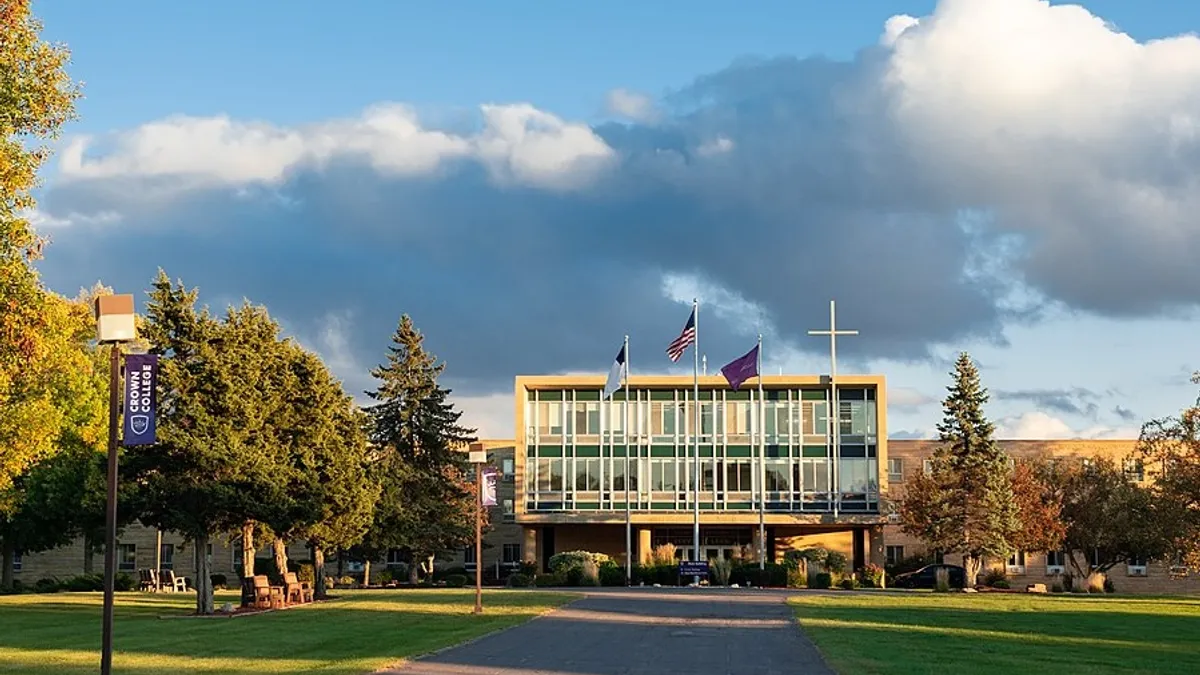Dive Brief:
- A federal judge is mulling whether to strike down a Minnesota law that bars colleges from participating in a high school dual enrollment program if they require students to sign statements of faith.
- State lawmakers barred Crown College and the University of Northwestern, two conservative Christian institutions, from participating in the Minnesota Postsecondary Enrollment Options program because they require on-campus students to sign conduct agreements based on religious beliefs.
- An attorney from the Becket Fund for Religious Liberty, the group that filed the lawsuit on behalf of the plaintiffs, told the judge at a hearing Monday that the law improperly targeted the colleges and infringed on their rights as religious organizations, according to The Associated Press.
Dive Insight:
Minnesota's PSEO program dates back to 1985 and gives high school students the opportunity to earn college credit for free at both public and private colleges. PSEO classes include nonsectarian college coursework and technical training, and students typically take the courses on the college's campus.
But the lawsuit challenges a Minnesota law that took effect in 2023. The state's Democrat-controlled Legislature passed a bill barring students from using PSEO funds at colleges that require faith statements or make admission decisions based on "race, creed, ethnicity, disability, gender, or sexual orientation or religious beliefs or affiliations."
Minnesota Gov. Tim Walz signed the change into law as part of a flurry of LGBTQ+ protections.
Crown’s policies say the college does not tolerate involvement or promotion of what it describes as “homosexual behavior,” while University of Northwestern has students and employees pledge to abstain from “same sex romantic intimacy.” However, the colleges do not require remote students to abide by their statements of faith.
In their May 2023 lawsuit, the colleges alleged that the state law forces them to choose between offering on-campus PSEO programming and maintaining their religious practices. They were joined by parents who want their children to use PSEO funds at one of the two colleges.
A loss of the program's funding would cause "significant harm" to the colleges "in the form of lost revenue and recruiting opportunities," the filing said.
PSEO reimburses participating colleges a percentage of tuition for each credit hour and other costs associated with teaching eligible high school students.
In the 2023-24 academic year, Crown admitted 70 students through PSEO, according to the lawsuit. The same year, the University of Northwestern admitted 183 PSEO students, and it said on average about 40% end up enrolling after graduating from high school.
In June 2023, a federal judge ruled that both colleges could continue participating in the program while the litigation proceeded.
Eric Baxter, an attorney with the Becket Fund for Religious Liberty, said at Monday's hearing that the state had no evidence the colleges' admissions requirements “were causing a problem that was so compelling that they had to restrict these schools’ religious practices,” per The Associated Press.
If the colleges prevail in their federal lawsuit against the Minnesota Department of Education, the state would be forced to reverse PSEO's ban on mandatory faith statements.
The Minnesota Department of Education did not immediately respond to a request for comment Tuesday.
In a Monday statement, University of Northwestern President Corbin Hoornbeek accused the state of treating his institution unfairly.
"Minnesota wants to single out our university because of this unique campus culture which integrates faith and learning," he said.
Crown President Andrew Denton cited his institution's decades of participating in the program.
"We pray that the court will continue to allow every student in Minnesota to use PSEO funds at the school that best meets their needs and matches their values,” he said in a Monday statement.














